The shortlist has been published for the contenders in the 2015 William Hill Sports Book of the Year. The winner will be announced on Thursday 26 November.
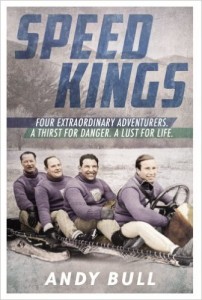 Speed Kings by Andy Bull
Speed Kings by Andy Bull
In the 1930s, as the world hurtled towards terrible global conflict, speed was all the rage. It was described by Aldous Huxley as ‘the one genuinely modern pleasure’, and one of the fastest and most thrilling ways to attain it was through the new sport of bobsledding. Exotic, exciting and above all dangerous, it was by far the most popular event at the Lake Placid Winter Olympics. It required an abundance of skill and bravery. And the four men who triumphed at those Games lived the most extraordinary lives.
Billy Fiske was an infamous daredevil, blessed with a natural talent for driving. He would later become the first American airman to die in the war – flying for the RAF. Clifford Gray was a notorious playboy and a player on both Broadway and Hollywood. Or was he? His identity was a mystery for decades. Jay O’Brien was a gambler and a rogue who, according to one ex-wife, forced women to marry him at gunpoint. And Eddie Eagan, a heavyweight boxer and brilliant lawyer, remains the only man to win gold at both the Summer and Winter Olympics.
This is their story, of loose living, risk-taking and hell-raising in an age of decadence, and of their race against the odds to become the fastest men on ice. We will never see their like again. Especially after the world did descend into that second, terrible global conflict.
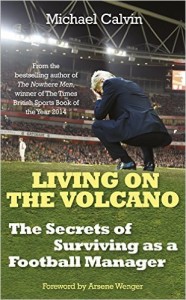 Living on the Volcano: The Secrets of Surviving as a Football Manager by Michael Calvin
Living on the Volcano: The Secrets of Surviving as a Football Manager by Michael Calvin
A man punches the wall in a strategic show of anger. Another complains he has become a stranger to those he loves. A third relies on “my three a day: coffee, Nurofen and a bottle of wine.” Yet another admits he is an oddity, who would prefer to be working in cricket. A fifth describes his professional life as “a circus”. These are football managers, live and uncut. Arsene Wenger likens the job to “living on a volcano: any day may be your last”. He speaks with the authority of being the longest serving manager in the English game, having been at Arsenal for 17 years. The average lifespan of a Football League manager is 17 months. Fifty three managers, across all four Divisions, were sacked, or resigned, in the 2012-13 season. There were fifty seven managerial changes in the 2013-14 season. What makes these men tick? They are familiar figures, who rarely offer anything more than a glimpse into their personal and professional lives. What shapes them? How and why do they do their job? Award-winning writer Michael Calvin provides the answers.
Insecurity is a unifying factor, but managers at different levels face different sets of problems. Depending on their status, they are dealing with multi-millionaires, or mortgage slaves. Living on the Volcano charts the progress of more than 20 managers, in different circumstances and in different phases of their career. Some, like Brendan Rodgers and Roberto Martinez, are at the peak of their profession. Others, like Chris Hughton, Brian McDermott and Gary Waddock, have been sacked, and are seeking a way back into the game. They offer a unique insight into a trade which is prone to superficial judgement and savage swings in fortune. Management requires ruthlessness and empathy, idealism and cunning. Stories overlap, experiences intermingle, and myths are exposed.
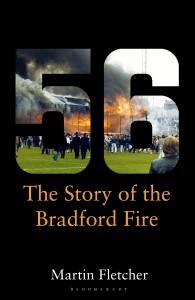 Fifty-Six: The Story of the Bradford Fire by Martin Fletcher
Fifty-Six: The Story of the Bradford Fire by Martin Fletcher
On May 11 1985, fifty-six people died in a devastating fire at Bradford City s old Valley Parade ground. It was truly horrific, a startling story and wholly avoidable but it had only the briefest of inquiries, and it seemed its lessons were not learned.
Twelve-year-old Martin Fletcher was at Valley Parade that day, celebrating Bradford s promotion to the second flight, with his dad, brother, uncle and grandfather. Martin was the only one of them to survive the fire the biggest loss suffered by a single family in any British football disaster.
In later years, Martin devoted himself to extensively investigating how the disaster was caused, its culture of institutional neglect and the government s general indifference towards football fans safety at the time. This book tells the gripping, extraordinary in-depth story of a boy s unthinkable loss following a spring afternoon at a football match, of how fifty-six people could die at a game, and of the truths he unearthed as an adult. This is the story thirty years on of the disaster football has never properly acknowledged.
 The Game of Our Lives: The Meaning and Making of English Football by David Goldblatt
The Game of Our Lives: The Meaning and Making of English Football by David Goldblatt
In the last two decades football in Britain has made the transition from a peripheral dying sport to the very centre of our popular culture, from an economic basket-case to a booming entertainment industry. What does it mean when football becomes so central to our private and political lives? Has it enriched us or impoverished us?
In this book David Goldblatt argues that no social phenomenon tracks the momentous economic, social and political changes of the post-Thatcherite era in a more illuminating manner than football, and no cultural practice sheds more light on the aspirations and attitudes of our long boom and subsequent bust.
Fire in Babylon: How a West Indies Cricket Team Brought a People to its Feet by Simon Lister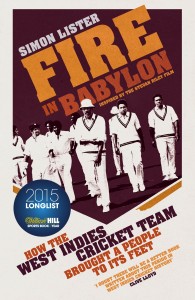
Cricket had never been played like this. Cricket had never meant so much.
The West Indies had always had brilliant cricketers; it hadn’t always had brilliant cricket teams. But in 1974, a man called Clive Lloyd began to lead a side which would at last throw off the shackles that had hindered the region for centuries. Nowhere else had a game been so closely connected to a people’s past and their future hopes; nowhere else did cricket liberate a people like it did in the Caribbean.
For almost two decades, Clive Lloyd and then Vivian Richards led the batsmen and bowlers who changed the way cricket was played and changed the way a whole nation – which existed only on a cricket pitch – saw itself.
With their pace like fire and their scorching batting, these sons of cane-cutters and fishermen brought pride to a people which had been stifled by 300 years of slavery, empire and colonialism. Their cricket roused the Caribbean and antagonised the game’s traditionalists.
Told by the men who made it happen and the people who watched it unfold, Fire in Babylon is the definitive story of the greatest team that sport has known.
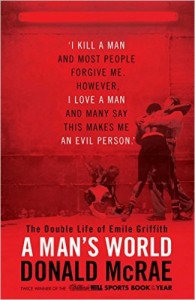 A Man’s World: The Double Life of Emile Griffith by Donald McRae
A Man’s World: The Double Life of Emile Griffith by Donald McRae
‘I kill a man and most people forgive me. However, I love a man and many say this makes me an evil person.’
On 24 March 1962, when Emile Griffith stepped into the ring in Madison Square Garden to defend his world title against Benny Paret, he was filled with rage. During their weigh-in, the Cuban challenger had denounced Griffith as a ‘faggot’ and minced towards him. In the macho world of boxing, where fighters know they are engaged in the hurt game, there could be no greater insult. At that time, it was illegal for people of the same gender to have sex, or even for a bar to knowingly serve a drink to a gay person. It was an insinuation that could have had dangerous consequences for Griffith – especially as it was true.
In the fight that followed, Griffith pounded Paret into unconsciousness, and the Cuban would die soon after, leaving Griffith haunted by what he had done. Despite this, he went on to fight more world championship rounds than any other fighter in history in a career that lasted for almost 20 years.
In Donald McRae’s first sports book in more than a decade, he weaves a compelling tale of triumph over prejudice – Griffith was black, so doubly damned by contemporary society, but refused to cower away as society wished. A Man’s World is sure to become a classic among sports books.
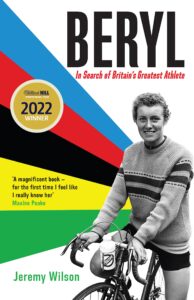 Football may have had two titles in the shortlist of five finalists – Be Good, Love Brian: Growing Up with Brian Clough by Craig Bromfield and Expected Goals: The Story of how Data Conquered Football and Changed the Game Forever by Rory Smith – but it was Beryl – In Search of Britain’s Greatest Athlete, Beryl Burton by Jeremy Wilson that took the top prize.
Football may have had two titles in the shortlist of five finalists – Be Good, Love Brian: Growing Up with Brian Clough by Craig Bromfield and Expected Goals: The Story of how Data Conquered Football and Changed the Game Forever by Rory Smith – but it was Beryl – In Search of Britain’s Greatest Athlete, Beryl Burton by Jeremy Wilson that took the top prize. Yet she carried on winning, beating men and – infamously – competing against her own daughter, while working on a farm and running a household. Her motivation, sparked by appalling childhood illness, is as fascinating as her achievements are stunning.
Yet she carried on winning, beating men and – infamously – competing against her own daughter, while working on a farm and running a household. Her motivation, sparked by appalling childhood illness, is as fascinating as her achievements are stunning.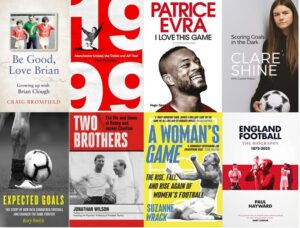 The longlist for the 34th William Hill Sports Book of the Year Award has been revealed. A record 158 books were entered into this year’s Award, featuring a diverse mix of authors from across a wide range of sports including, tennis, football, athletics, golf, rugby and cycling.
The longlist for the 34th William Hill Sports Book of the Year Award has been revealed. A record 158 books were entered into this year’s Award, featuring a diverse mix of authors from across a wide range of sports including, tennis, football, athletics, golf, rugby and cycling. The disastrous performance by Loris Karius for Liverpool in the Champions League Final against Real Madrid is just another reminder of the vulnerable role of the goalkeeper, someone who is always walking a tightrope between would-be hero and scapegoat for any failure. The worst thing is that the goalkeeper himself believes this. No such self-doubt seems to exist with attackers like Cristiano Ronaldo. All the glory is his, any failure is somebody else’s fault – every single time.
The disastrous performance by Loris Karius for Liverpool in the Champions League Final against Real Madrid is just another reminder of the vulnerable role of the goalkeeper, someone who is always walking a tightrope between would-be hero and scapegoat for any failure. The worst thing is that the goalkeeper himself believes this. No such self-doubt seems to exist with attackers like Cristiano Ronaldo. All the glory is his, any failure is somebody else’s fault – every single time. Tom Simpson: Bird on the Wire by Andy McGrath has won the 2017 WHSBOTY Award. It is the fourth book to scoop the prize following on from, Rough Ride: An Insight into Pro Cycling (1990), It’s Not About the Bike: My Journey Back to Life (2000) and The Secret Race: Inside the Hidden World of the Tour de France: Doping, Cover-ups, and Winning at All Costs (2012).
Tom Simpson: Bird on the Wire by Andy McGrath has won the 2017 WHSBOTY Award. It is the fourth book to scoop the prize following on from, Rough Ride: An Insight into Pro Cycling (1990), It’s Not About the Bike: My Journey Back to Life (2000) and The Secret Race: Inside the Hidden World of the Tour de France: Doping, Cover-ups, and Winning at All Costs (2012). The 2016 William Hill Sports Book of the Year has announced it Shortlist, which consists of seven titles:
The 2016 William Hill Sports Book of the Year has announced it Shortlist, which consists of seven titles: Now in its 28th year, the William Hill Sports Book of the Year Award is the world’s longest established and most valuable literary sports-writing prize.
Now in its 28th year, the William Hill Sports Book of the Year Award is the world’s longest established and most valuable literary sports-writing prize. The Game of Our Lives: The Meaning and Making of English Football by David Goldblatt has been announced as the winner of the 2015 William Hill Sports Book of the Year.
The Game of Our Lives: The Meaning and Making of English Football by David Goldblatt has been announced as the winner of the 2015 William Hill Sports Book of the Year. Speed Kings by Andy Bull
Speed Kings by Andy Bull Living on the Volcano: The Secrets of Surviving as a Football Manager by Michael Calvin
Living on the Volcano: The Secrets of Surviving as a Football Manager by Michael Calvin Fifty-Six: The Story of the Bradford Fire by Martin Fletcher
Fifty-Six: The Story of the Bradford Fire by Martin Fletcher
 A Man’s World: The Double Life of Emile Griffith by Donald McRae
A Man’s World: The Double Life of Emile Griffith by Donald McRae The longlist has been published for the contenders in the 2015 William Hill Sports Book of the Year. The shortlist will be announced on 27 October, and the winner on Thursday 26 November.
The longlist has been published for the contenders in the 2015 William Hill Sports Book of the Year. The shortlist will be announced on 27 October, and the winner on Thursday 26 November. The William Hill Sports Book of the Year is an award that is never afraid to tackle serious subjects, as witnessed by the recent winners. In 2011 A Life Too Short: The Tragedy of Robert Enke explored the depression and subsequent suicide of the one-time German international goalkeeper, while in 2012 (The Secret Race: Inside the Hidden World of the Tour de France) and 2013 (Doped: The Real Life Story of the 1960s Racehorse Doping Gang), the murkier side of cycling and horseracing were exposed.
The William Hill Sports Book of the Year is an award that is never afraid to tackle serious subjects, as witnessed by the recent winners. In 2011 A Life Too Short: The Tragedy of Robert Enke explored the depression and subsequent suicide of the one-time German international goalkeeper, while in 2012 (The Secret Race: Inside the Hidden World of the Tour de France) and 2013 (Doped: The Real Life Story of the 1960s Racehorse Doping Gang), the murkier side of cycling and horseracing were exposed.